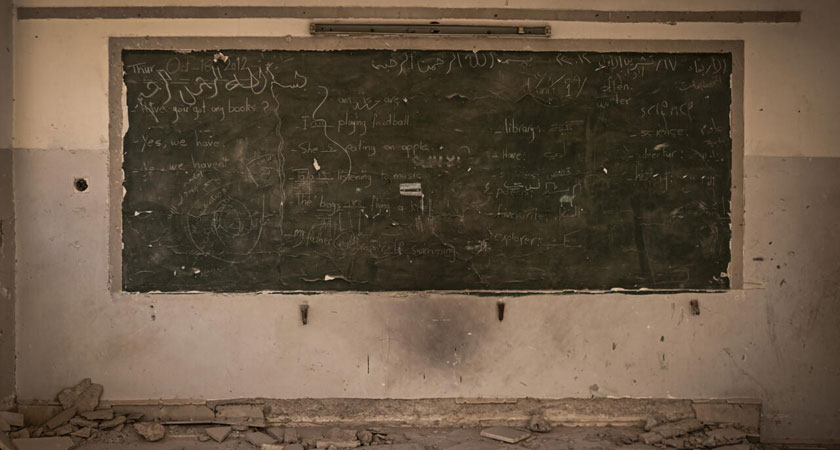 School lessons ended in Syria’s biggest Palestinian refugee camp on October 18, 2012, judging by the date still chalked up on the board more than a decade later.
School lessons ended in Syria’s biggest Palestinian refugee camp on October 18, 2012, judging by the date still chalked up on the board more than a decade later.
“I am playing football”; “She is eating an apple”; “The boys are flying a kite” are written in English.
Outside, the remaining children in the Damascus suburb of Yarmuk now play among the shattered ruins left by Syria’s years of civil war.
And as the kids chase through clouds of concrete dust, a torture victim — freed from jail this month when rebels toppled Bashar al-Assad’s government — hobbles through the rubble.
“Since I left the prison until now, I sleep one or two hours max,” 30-year-old Mahmud Khaled Ajaj told AFP.
Since 1957, Yarmuk has been a 2.1-square-kilometre (519-acre) “refugee camp” for Palestinians displaced by the founding of the modern Israeli state.
Like similar camps across the Middle East, over the decades it has become a dense urban community of multi-storey concrete housing blocks and businesses.
According to the United Nations agency for Palestinian refugees, UNRWA, at the start of Syria’s conflict in 2011 it was home to 160,000 registered refugees.
Rebellion, air strikes and a siege by government forces had devastated the area and left by September this year only 8,160 people still clinging to life in the ruins.
With Assad’s fall, more may return to reopen the damaged schools and mosques, but many like Ajaj will have terrible tales to tell of Assad’s persecution.
The former Free Syrian Army rebel fighter spent seven years in government custody, most of it at the notorious Saydnaya prison, and was only released when Assad’s rule ended on December 8.
Ajaj’s face is still paler than those of his neighbours, who are tanned from sitting outside ruined homes, and he walks awkwardly with a back brace after years of beatings.
At one point, a prison doctor injected him in the spine and partly paralysed him — he thinks on purpose — but what really haunts him was the hunger in his packed cell.
“My neighbours and relatives know that I had little food, so they bring me food and fruit. I don’t sleep if the food is not next to me. The bread, especially the bread,” he said.
“Yesterday, we had bread leftovers,” he said, relishing being outside after his windowless group cell, and ignoring calls from his family to come to see a concerned aunt.
“My parents usually keep them for the birds to feed them. I told them: ‘Give part of them to the birds and keep the rest for me. Even if they are dry or old I want them for me’.”
As Ajaj spoke to AFP, two passing Palestinian women paused to see if he had any news of missing relatives since Syria’s ousted leader fled to Russia.